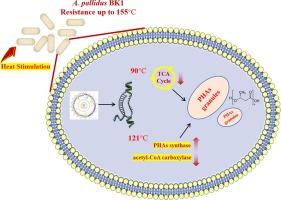高温刺激可增强嗜热菌苍白球杆菌 BK1 的聚羟基烷酸积累。
IF 9.7
1区 环境科学与生态学
Q1 AGRICULTURAL ENGINEERING
引用次数: 0
摘要
聚羟基烷酸酯(PHAs)是一种细胞内储存聚合物,可增强细菌在环境中的抵抗力。虽然对嗜热菌在高温刺激下的 PHAs 调节作用研究不足,但本研究对嗜热菌 Aeribacillus pallidus BK1(一种耐热性高达 155 ℃ 的嗜热菌)进行了调查。结果表明,苍白杆菌的 PHAs 产量为 1.45 克/升。经过 90 °C 和 121 °C 的刺激后,PHAs 产量翻了一番,达到 3.33 g/L。PHAs 比率从 35.63 %(60 °C)增加到 75.46 %(90 °C)和 77.15 %(121 °C)。RNA-seq 分析显示,在这两种温度下,激活葡萄糖转运体以提高葡萄糖摄取量是一种共同的策略。90 °C时,A. pallidus BK1优先考虑PHAs的积累,而不是TCA循环。121 °C时,通过上调单体聚合和下调乙酰-CoA羧化酶的表达,PHAs的产生进一步增强。这些发现为了解嗜热菌的高温防御机制提供了宝贵的见解,并表明苍蝇BK1有望成为在热刺激下生产PHAs的生物生产平台。本文章由计算机程序翻译,如有差异,请以英文原文为准。

High-temperature stimulation enhances polyhydroxyalkanoates accumulation in thermophile Aeribacillus pallidus BK1
Polyhydroxyalkanoates (PHAs) are intracellular storage polymers that enhance bacterial resistance in environments. While the role of PHAs regulation in thermophiles under high-temperature stimulation is understudied, this work investigates Aeribacillus pallidus BK1, a thermophile with heat resistance up to 155 °C. Our results showed that A. pallidus’s PHAs yield was 1.45 g/L. After 90 °C and 121 °C stimulations, the PHAs yield doubled to 3.33 g/L. The PHAs ratios increased from 35.63 % (60 °C) to 75.46 % (90 °C) and 77.15 % (121 °C). RNA-seq analysis revealed a common strategy of activating glucose transporters to enhance glucose uptake at both temperatures. At 90 °C, A. pallidus BK1 prioritized PHAs accumulation over the TCA cycle. At 121 °C, PHAs production was further enhanced by upregulating monomer polymerization and downregulating acetyl-CoA carboxylase expression. These findings offered valuable insights into the high-temperature defense mechanisms of thermophiles and suggested that A. pallidus BK1 holds promise as a bio-production platform for PHAs production under thermal stimulation.
求助全文
通过发布文献求助,成功后即可免费获取论文全文。
去求助
来源期刊

Bioresource Technology
工程技术-能源与燃料
CiteScore
20.80
自引率
19.30%
发文量
2013
审稿时长
12 days
期刊介绍:
Bioresource Technology publishes original articles, review articles, case studies, and short communications covering the fundamentals, applications, and management of bioresource technology. The journal seeks to advance and disseminate knowledge across various areas related to biomass, biological waste treatment, bioenergy, biotransformations, bioresource systems analysis, and associated conversion or production technologies.
Topics include:
• Biofuels: liquid and gaseous biofuels production, modeling and economics
• Bioprocesses and bioproducts: biocatalysis and fermentations
• Biomass and feedstocks utilization: bioconversion of agro-industrial residues
• Environmental protection: biological waste treatment
• Thermochemical conversion of biomass: combustion, pyrolysis, gasification, catalysis.
 求助内容:
求助内容: 应助结果提醒方式:
应助结果提醒方式:


